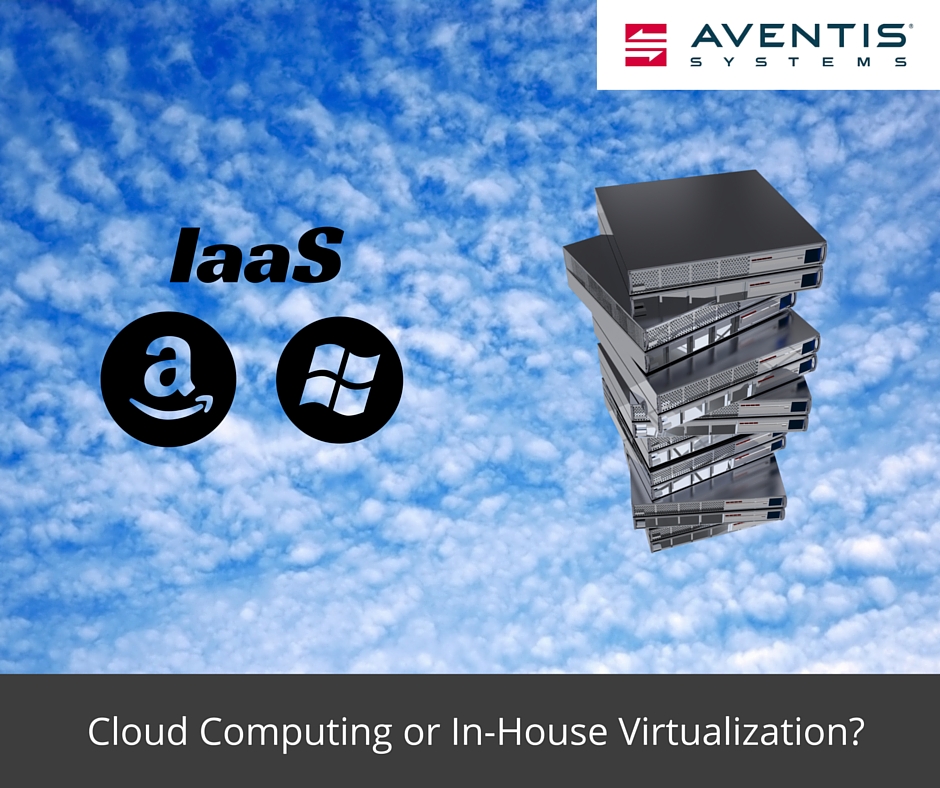Should Your Business Invest in Cloud Computing or In-House Virtualization?
With so much emphasis being placed on cloud computing and its many benefits, it can be hard for small and midsize businesses to take a step back and consider if the cloud is right for every situation. When it comes to deciding whether an organization should choose cloud computing or in-house virtualization, there is no cut-and-dry answer that’s a perfect fit for every business. Both options have benefits and drawbacks, therefore businesses have to decide which option is right for them on a case-by-case basis.

What Is the Difference Between Cloud and Virtualization Solutions?
Cloud services are those that use third party servers to store software and data. Google Apps, Microsoft Azure, and Amazon Web Services are some common examples of cloud services. The services and data are stored on these third party providers’ servers and accessed by users over the Internet.
Virtualization services tend to be business software applications like accounting software or customer relationship management systems where an organization stores the software on a central server, but end-users experience them as though they are installed directly on their computer’s hard drive. These applications are run on virtual servers hosted on a single or a few physical servers, offering easy deployment, automated backup and restore features and more to minimize the chance of downtime.
Costs
One of the key benefits of cloud services is that the IT infrastructure is provided by a third-party organization, the cloud services provider. If your organization wants to avoid making large-scale investments in its own IT infrastructure, the cloud can offer lower up-front costs. Instead of paying large up-front capital expenses, organizations that opt for the cloud are able to pay more manageable operating expenses over time. The idea of spreading out payments over time for cloud as a service is often very attractive for smaller businesses that have limited budgets to work with.
Scalability
In addition to deferring the up-front costs of an IT infrastructure, many businesses appreciate that working with a cloud provider allows them to take a pay-as-you-grow approach. Since the infrastructure is provided by a third-party company, it’s easy to add more capacity and performance over time to support their clients’ changing needs. This gives smaller businesses unmatched flexibility, because they don’t have to start out paying for capabilities they don’t need yet. Doing so saves the company money to start with, and allows it to grow into the high-performance offerings at its own pace.
However, as demand for capacity and higher performance grows, service upgrades can become expensive and result in an increasing cost spiral. For organizations that have opted for cloud-based infrastructure, this is often the point when switching to in-house virtualization makes the most financial sense -- assuming any fees to terminate the cloud service agreement aren’t a significant obstacle. Organizations that opt for virtualization aren’t required to buy newer or more powerful servers than they need -- as with any capital investment, there are opportunities to purchase refurbished equipment, which fulfills the organization’s needs. As more power and capacity is required, servers that are owned by the organization may have resale value which offsets the cost of upgrading.
Customization
One reason some businesses prefer in-house virtualization over cloud is that it allows the business to hold complete control over their IT infrastructure, instead of depending on a third-party organization. For instance, if there are particular technologies you want to make sure are deployed within your IT environment, you may not be able to get those technologies if you depend on an outside organization to build everything for you. In addition, if you find yourself having to change course unexpectedly, having your own staff running the infrastructure makes this much easier to do.
Security
Finally, many businesses prefer to work in-house because they know if gives them greater visibility and auditability into their IT infrastructure, which in turn makes it easier for them to protect sensitive data assets. When you place data in the care of a cloud services provider, you are essentially placing all the responsibility for protecting that data and intellectual property into the hands of another company. Although cloud providers usually offer adequate levels of security, some businesses just aren’t willing to take that risk, and creating service level agreements to ensure risks are mitigated and managed can be complicated, costly and difficult to enforce. Further, in the event of a data breach, your customers will blame your company -- not the cloud computing organization you chose -- for failing to protect their information. For businesses that believe doing something right means doing it yourself, in-house virtualization gives them that opportunity.
Final Thoughts
Each option has its drawbacks and advantages, which means choosing between cloud computing and in-house virtualization can be difficult. For many organizations the choice comes down to the level of control they want and are prepared to invest in. While cloud computing offers convenience and rapid, low-cost scalability, in-house virtualization allows organizations a greater degree of control over software upgrades, security offerings, scheduled maintenance windows and other operational considerations.
To talk with a virtualization expert about your options for cloud computing, server solutions and VMware, contact us today.